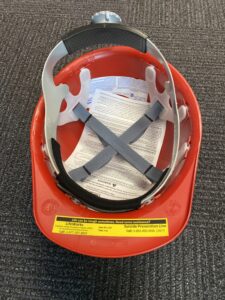
Promoting psychological safety in construction
By Justin Leisle
Construction Health & SafetyEmpowering innovation and well-being.

Adding a sticker with contact information for support providers is a great way to ensure that everyone on a site can access help when they have need. (Photo courtesy of Ventana Construction)
Creating a culture of psychological safety is crucial for innovation and well-being in construction. Fostering an environment where individuals freely express ideas, share concerns, and take calculated risks without fear of repercussions, psychological safety enhances teamwork and project outcomes.
In the wake of the pandemic, construction organizations and leaders have grown increasingly cognizant of the imperative to prioritize mental health and psychological safety within the industry. Addressing the alarmingly high suicide rate and the repercussions of the overdose crisis calls for innovative approaches.
A spectrum of support and resources is being made available to assist individuals working at construction job sites, while senior management is actively endorsing and championing these initiatives. Despite these efforts, however, a persisting “old school” mentality can still be observed at a number of job sites.
RESOURCES AND SUPPORT
Workers’ safety and well-being is of the utmost importance, which is why providing them with essential resources is crucial. One way to do this is by ensuring that each worker has access to important contact information. This information can be shared through the use of posters or QR codes in strategic locations like washrooms, outhouses and notice boards.
In my home province of British Columbia, this can include the use of such tools as the mental health and wellness resources developed by the Independent Contractors and Businesses Association (ICBA), as well as company wellness programs that champion mental health and wellness initiatives.
Make sure that your people know how to connect with, and use, Employee and Family Assistance Programs, and given the heightened risk in the sector, share the hotline number for the suicide prevention hotline in your region. By having this information readily available, such as on the inside brim of their hard hat, workers can easily reach out or get information for support and assistance when needed.
CONTINUOUS COMMUNICATION
To combat the stigma associated with mental health, we have observed that incorporating discussions on this topic during toolbox meetings, trade meetings, and even company newsletters, can create a normalizing effect while raising awareness.
Additionally, implementing open-invite, peer-to-peer drop-in hours for managers creates a safe space for employees to connect and engage in meaningful conversations. This fosters a supportive environment and provides opportunity to connect employees with relevant community organizations and address individual needs effectively.
EMPOWERING MANAGERS
Construction workers and leaders, including front-line supervisors, foremen, first aid attendants, and workers, can receive valuable support through comprehensive mental health first aid, suicide intervention training, and overdose prevention training.
By prioritizing inclusiveness and promoting a culture of active engagement, programs like the “Be more than a bystander” training, offered by the B.C. Centre for Women in the Trades, help promote a culture of active engagement while putting a priority on inclusiveness. Training courses like this are a great resource to empower individuals and enhance their ability to support those in need.
By encouraging the open expression of ideas, sharing concerns, and taking calculated risks, teamwork and project outcomes are enhanced.
Prioritizing mental health and psychological safety by offering additional training, accessible resources and support to address the high suicide rate and overdose crisis, and taking proactive measures like providing essential contact information and promoting continuous communication, are key in ensuring a safer work environment.
Justin Leisle is a registered safety professional who serves as the director of health, safety, environment and quality at Ventana Construction Corporation.




